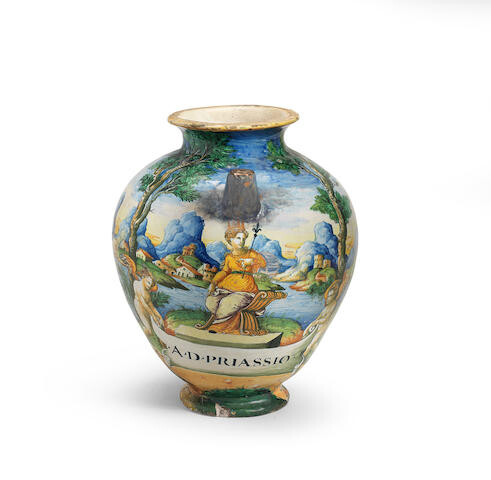A massive Urbino maiolica istoriato wet drug jar, attributed to the Fontana Workshop, circa 1565-70
En suite with the previous lot, of oval shape with a serpent handle over a moulded mask, decorated with two putti holding up a label reading 'A.D.PRIASSIO', above a seated crowned woman holding a sceptre flanked by trees, in a mountainous landscape with rocks and buildings, 34cm high (some restoration)
Provenance:
Property of The Mary Duke Biddle Trent Semans Foundation
This vessel is part of a series that is now believed to have been made in the workshop of Orazio Fontana for the apothecary of the Santuario di Loreto. A large part of the apothecary is in the Museo del Palazzo Apostolico di Loreto.
Another highly comparable wet drug jar of nearly the same size and shape is in the collection of the Casa di Risparmio di Perugia and was published by T. Wilson/E. Sani, Le maioliche rinascimentali nelle collezioni della Fondazione Casse di Risparmio di Perugia, (2006), cat.no 55, where the authors point out that the series can be attributed to the Fontana workshop based on stylistic comparison with a vase in the British Museum and a vase sold at auction in London in 1950, both inscribed 'FATE.IN.BOTEGA.DE.ORATIO.FONTANA' and 'FATTO IN URBINO IN BOTEGA DI ORATIO FONTANA', pp.166-170. It is plausible that the seated figure represents the city of Florence, holding a fleur-de-lys sceptre, though this theory cannot be proven. The decorative scheme recurs on a later series made in Pesaro or Castel Durante around 1574-75, where the crowned figure is sitting beneath a canopy. Both types are illustrated next to one-another in Rudolf E A Drey, Apothecary Jars (1978), plates 24a and 24b. Two vases of this type without the drug label, one in the Victoria and Albert museum (inv.no.8969&A-1863) and one formerly in the Spitzer collection, are inscribed 'Fatto in Urbino' (made in Urbino).
A further albarello of this type is in the Fitzwilliam Museum, illustrated in Julia Poole, Italian maiolica and incised slipware in the Fitzwilliam Museum (1995), no.411. She notes that there are some forty known pharmacy vessels, albarelli and ewers, most of which she lists, p.377. There are two further albarelli in the Metropolitan Museum, New York (inv. nos.1975.1.995 and 1975.1.996). A pair of similar wet drug jars was sold at Christie's Paris, Collection d'un amateur, 15 May 2003, lot 535, and a double-handled pharmacy jar of a similar size to this one at Christie's London, 2 November 2016, lot 199.
View it on
Sale price
Estimate
Time, Location
Auction House
En suite with the previous lot, of oval shape with a serpent handle over a moulded mask, decorated with two putti holding up a label reading 'A.D.PRIASSIO', above a seated crowned woman holding a sceptre flanked by trees, in a mountainous landscape with rocks and buildings, 34cm high (some restoration)
Provenance:
Property of The Mary Duke Biddle Trent Semans Foundation
This vessel is part of a series that is now believed to have been made in the workshop of Orazio Fontana for the apothecary of the Santuario di Loreto. A large part of the apothecary is in the Museo del Palazzo Apostolico di Loreto.
Another highly comparable wet drug jar of nearly the same size and shape is in the collection of the Casa di Risparmio di Perugia and was published by T. Wilson/E. Sani, Le maioliche rinascimentali nelle collezioni della Fondazione Casse di Risparmio di Perugia, (2006), cat.no 55, where the authors point out that the series can be attributed to the Fontana workshop based on stylistic comparison with a vase in the British Museum and a vase sold at auction in London in 1950, both inscribed 'FATE.IN.BOTEGA.DE.ORATIO.FONTANA' and 'FATTO IN URBINO IN BOTEGA DI ORATIO FONTANA', pp.166-170. It is plausible that the seated figure represents the city of Florence, holding a fleur-de-lys sceptre, though this theory cannot be proven. The decorative scheme recurs on a later series made in Pesaro or Castel Durante around 1574-75, where the crowned figure is sitting beneath a canopy. Both types are illustrated next to one-another in Rudolf E A Drey, Apothecary Jars (1978), plates 24a and 24b. Two vases of this type without the drug label, one in the Victoria and Albert museum (inv.no.8969&A-1863) and one formerly in the Spitzer collection, are inscribed 'Fatto in Urbino' (made in Urbino).
A further albarello of this type is in the Fitzwilliam Museum, illustrated in Julia Poole, Italian maiolica and incised slipware in the Fitzwilliam Museum (1995), no.411. She notes that there are some forty known pharmacy vessels, albarelli and ewers, most of which she lists, p.377. There are two further albarelli in the Metropolitan Museum, New York (inv. nos.1975.1.995 and 1975.1.996). A pair of similar wet drug jars was sold at Christie's Paris, Collection d'un amateur, 15 May 2003, lot 535, and a double-handled pharmacy jar of a similar size to this one at Christie's London, 2 November 2016, lot 199.



